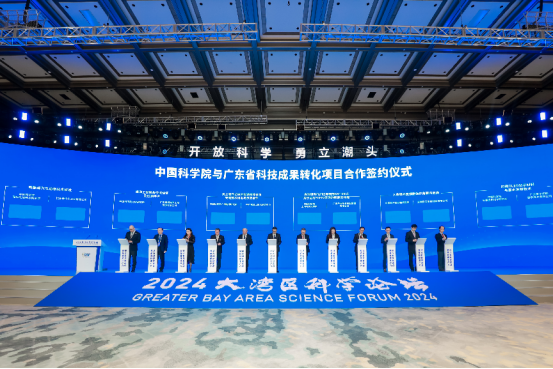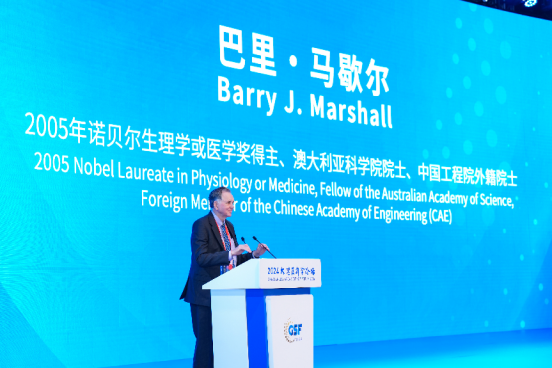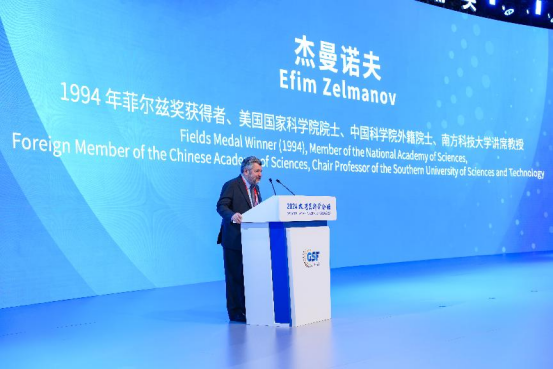On November 17th, the Greater Bay Area Science Forum 2024 officially kicked off in Guangzhou's Nansha District. This forum is jointly hosted by the People's Government of Guangdong Province, the Government of the Hong Kong Special Administrative Region, and the Government of the Macao Special Administrative Region for the first time.
Under the theme of "Leading through Open Science," the forum featured discussions on cutting-edge topics such as brain science and brain-inspired intelligence technologies, artificial intelligence, future materials, future energy, aerospace and ocean exploration, as well as green and low-carbon initiatives. Over a hundred academicians and experts from various fields across the globe participated in the event.


Welcome global tech talents to innovate and startup in GBA
Wang Weizhong, the Governor of Guangdong Province, stated in his speech that over the past five years, Guangdong, Hong Kong, and Macao have continuously promoted the alignment of rules, regulations and mechanisms while deepening cooperation in innovation factor resources, platforms, and projects. The Shenzhen-Hong Kong-Guangzhou technology cluster has ranked second globally in the innovation index for five consecutive years.
Wang further extended an invitation to scientists and innovators worldwide to come to Guangdong and the Guangdong-Hong Kong-Macao Greater Bay Area (GBA) for innovation, entrepreneurship, and creation.

During the opening ceremony, a scientific and technological achievements matching activity was held between the Chinese Academy of Sciences and Guangdong Province, with 12 major projects for scientific and technological cooperation being signed.
In addition, the forum also hosted a scientific and technological achievements matching meeting, featuring 240 exhibition projects that cover six key areas: new-generation information technology, new energy storage and renewable energy, aerospace, oceanography, and agriculture, biomedicine and health, high-end equipment and intelligent manufacturing, as well as new materials.
Top scientists discuss cutting-edge scientific issues

At the main forum, Barry J. Marshall, Nobel Laureate in Physiology or Medicine in 2005, Fellow of the Australian Academy of Science, and Foreign Member of the Chinese Academy of Engineering, delivered a keynote speech titled "Innovative Directions in Gastric Disease Diagnosis: A Nobel Laureate's Insights into Discovery, Innovation, and Translation."
Marshall explained that with the use of antibiotics to treat Helicobacter pylori, only about 20% of endoscopies in Australia are gastric endoscopies, allowing medical resources to be more focused on colorectal cancer screening.
"That's what's gonna happen here in China in the next 10 years. And that will really save billions of dollars," he said. He also revealed that the novel technique developed in Shenzhen, Guangdong for treating helicobacter pylori is going global and will be marketed in the next year.

Efim Zelmanov, the winner of the Fields Medal in 1994 and a member of the US National Academy of Sciences, and a foreign member of the Chinese Academy of Sciences, delivered a keynote speech titled "On Mathematics and Mathematical Talents."
Zelmanov believed that mathematics has no borders and that there is only one "mathematics" in the world. People from different countries learn from each other, study the same mathematical problems, and reach the same conclusions.
Zelmanov also suggested strengthening the connection between mathematical research, mathematicians, and schools, as well as between universities and high schools, to inspire mathematicians to work with children in schools.
Zelmanov further stated that Guangdong currently has excellent schools, a strong research system, and world-leading technology. In its future development, Guangdong should prioritize the establishment of world-leading research universities.
Reporter | Chen Jinxia
Photo | The Greater Bay Area Science Forum 2024
Editor | Hu Nan, James, Shen He
















